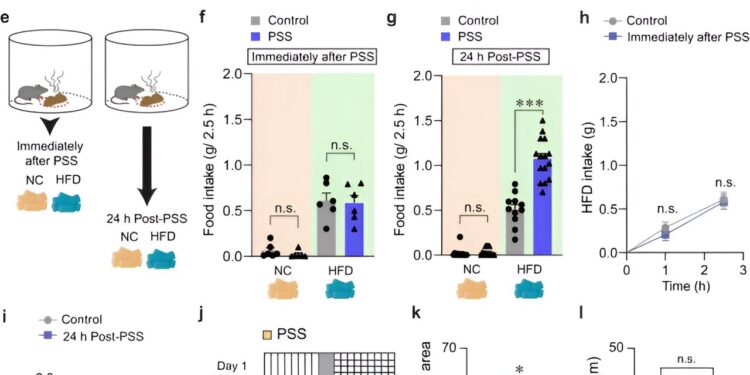Mice exhibit increased food intake for HFD, but not for NC, 24 h after PSS exposure. Credit: Natural communications (2023). DOI: 10.1038/s41467-023-42623-6
If you’ve almost had a car accident or been intimidated by a threatening person, you’ve probably felt it: a psychological reaction to threat called the fight or flight response. Your heart rate increases, anxiety grips you, and you might be shaking or sweating.
But a few hours after that stress passes, you may feel another reaction: a powerful desire for comfort food, highly processed, high-fat products that you know aren’t good for you. This can relieve stress and tension and provide a sense of control. Emotional eating following a stress-triggering interaction is familiar to many of us, as well as scientists.
But it’s unclear how threat signals your brain to want comfort food.
Now, a Virginia Tech scientist has identified a molecule found in a region of the brain called the hypothalamus, which is linked to changes in the brain that lead to emotional overeating. Sora Shin, an assistant professor at VTC’s Fralin Biomedical Research Institute, and his research team described the discovery in a paper published Oct. 28 in Natural communications.
“We don’t always eat because we’re hungry and have certain physical needs,” said Shin, who is also an assistant professor in the Department of Human Nutrition, Food and Exercise in the College of Agriculture and Science of Virginia Tech life. “Whenever we are stressed or feel threatened, it can also trigger our food motivation. We think this molecule is the culprit.”
Shin and his research team began their study by studying a small molecule, proenkephalin. This molecule is present in several parts of the brain, but little research has examined its role in the hypothalamus. Shin suspected this played a role in stress and eating, because the hypothalamus is a center for regulating eating behavior.
The lab exposed mice to the smell of cat feces. The smell of a natural predator triggered a threat response in mice, and 24 hours later, the mice exhibited a negative emotional state, overeating behavior, and neurons in their brains showed sensitivity to eating foods high in fat.
To confirm the molecule’s role in stress-induced eating, the researchers artificially activated the same neurons with light stimulating a genetically encoded molecule expressed in the neuronal cell membrane, without the predator’s odor, and observed a similar response. Furthermore, when they exposed the mice to the smell of the cat and pacified the reaction of the neurons expressing this molecule with the same technique, the mice showed no negative emotional states and did not overeat.
“So something in this molecule itself is very critical for inducing overconsumption after the threat,” Shin said.
The discovery points to a possible target for therapy aimed at alleviating emotionally triggered eating.
“We still have a lot to learn about this molecule,” Shin said, “but we have found its location and that could be a good place to start.”
The first authors of Shin’s study are In-Jee You, a former research associate at the institute, and Yeeun Bae, a graduate student in human nutrition, food and exercise working in his lab.
More information:
In-Jee You et al, Lateral hypothalamic proenkephalin neurons drive threat-induced overeating associated with a negative emotional state, Natural communications (2023). DOI: 10.1038/s41467-023-42623-6
Provided by Virginia Tech
Quote: Scientists discover potential brain link between stress and emotional eating (November 27, 2023) retrieved November 28, 2023 from
This document is subject to copyright. Except for fair use for private study or research purposes, no part may be reproduced without written permission. The content is provided for information only.



